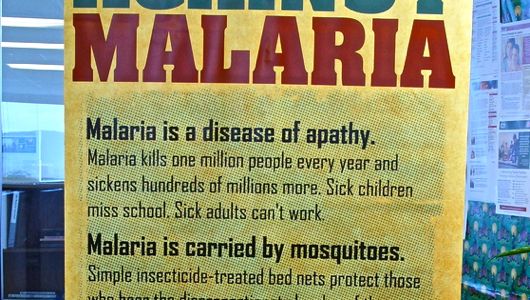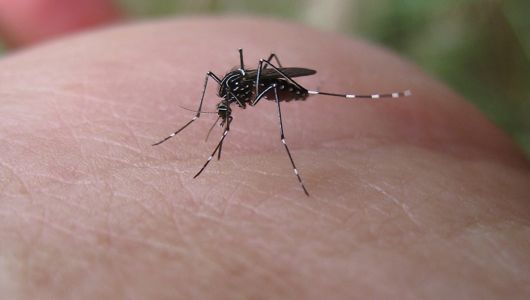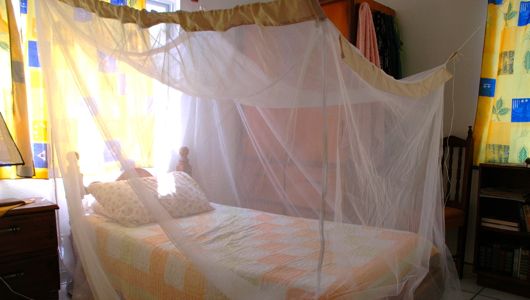The Author: Laurie Bouck is a medical writer and co-author of The Complete Idiot’s Guide to Vaccinations. She writes about health and medicine on her blog, MedFly (med-fly.blogspot.com).
Malaria and Travel
Every adventurous traveler will probably pass through a malaria-prone area at some point. If you’re traveling to tropical areas, sub-tropical areas or even Eastern Europe, you might be exposed to this pernicious parasitic disease.
Best known for its flu-like symptoms such as a high fever and chills, if malaria is left untreated it can cause dangerous or even fatal complications. Pregnant women, young children, and people who live in areas where malaria is rare (such as the United States) are at special risk for becoming seriously ill if they catch malaria during their travels.

Because the malaria parasites are becoming resistant to some antimalarial medicines, researchers have been working on a malaria vaccine for decades. Although clinical trials of the current vaccine candidates are very promising, there is no malaria vaccine available to the public yet (as of 2010).
Instead, travelers to malaria-prone regions can protect themselves in two ways: by taking antimalarial medications that are most likely to provide protection in the regions they will visit, and/or by avoiding the mosquitoes that transmit malaria. Keep in mind that even if you’ve had malaria in the past, or lived in a malaria-prone area, you can still catch it again, and need to take steps to prevent it.
What Is Malaria?
Malaria is a parasite that is transmitted, in most cases, by certain species of mosquitoes. If an infected mosquito bites you, the parasite in its saliva enters your blood and travels to your liver to grow. Once it matures, the parasite leaves your liver, enters your blood, and causes symptoms.
It can take a week, several months, or even a year or longer for symptoms to appear after you are infected with malaria. The most common malaria symptoms are a high fever, body aches, chills and sweating. Malaria infection can also cause nausea and vomiting, headaches, diarrhea, and other problems. In serious cases, however, a malaria infection can cause complications such as brain damage, breathing trouble, or kidney failure.
Four different species of a parasite cause malaria. The most dangerous forms of malaria are caused by the Plasmodium falciparum species, which is widespread in sub-Saharan Africa.

Sub-Saharan Africa is the most common source of malaria infection among U.S. travelers. Almost sixty percent of the roughly 11,000 cases of malaria in the U.S. from 1997 to 2006 were acquired there, according to the CDC. Another 14% of U.S. infections during that time period were acquired in Asia, and 13% were acquired in the Caribbean, Central America, or South America.
Planning Ahead to Prevent Malaria
Your risk of catching malaria varies widely, depending on how long you will be traveling, which countries you visit, and where and how you travel within each country. In some regions, malaria risk changes seasonally as well. The CDC’s Malaria Map application can help you assess your risk for malaria based on your travel itinerary. It provides updated information on malaria risks and recommended antimalarial medications for every region of the world.
Making decisions about whether you need antimalarial medications, and which medications to take, can be a complicated process. That’s why it’s smart to seek out a travel health specialist to sort through all these details. Contact your local health department, or go to the CDC’s Travelers’ Health website, or the International Society of Travel Medicine to find a travel health specialist in your area.
Try to visit the doctor at least two months before you leave on your trip to discuss your travel plans and any antimalarial medications, or travel vaccinations, that you might need. Bring a detailed travel itinerary, and be prepared to discuss each family member’s health and medication history.
Antimalarial medicines (chemoprophylaxis)
If you take antimalarial medications, you will need to start taking them before you enter a malaria-prone region, and keep taking them for a week or longer after you leave the area.
Five antimalarial medications are currently available in the United States, according to the CDC’s 2010 Yellow Book, an international travel health guide written for health care providers. Your doctor can tell you more about your medication options, how to take the medicines, potential side effects, and what to do if you catch malaria. As an overview, (based on the 2010 Yellow Book), your antimalarial medication choices are:

Atovaquone/Proguanil: Take this combination of two drugs daily. Side effects can include stomach pain, nausea and vomiting, or headache. It is not recommended for pregnant women, children who weigh less than 11 pounds, or people with certain kidney problems; discuss the medication with your doctor if you take the anticoagulant coumadin (warfarin).
Doxycycline: Take daily. Side effects can include sun sensitivity, nausea and vomiting, and vaginal yeast infections. Tell your doctor if you are taking certain drugs for acne treatment, if you are allergic to tetracyclines, or if you had an oral typhoid vaccine recently. It is not recommended for pregnant women or children under 8 years old.
Primaquine: Take daily. Can cause gastrointestinal problems. It is not safe for children or adults who have the hereditary disease G6PD (glucose-6-phosphate dehydrogenase) deficiency. Your doctor will test you or your child for G6PD before prescribing this medication.
Chloroquine or Hydroxychloroquine: Take weekly. Chloroquine can be given to infants or children. Side effects can include gastrointestinal problems, dizziness, headache, insomnia, blurred vision, and itching. This medication might not be recommended if you have psoriasis.
Mefloquine: Take weekly. Mefloquine can be given to infants or children. Side effects can include gastrointestinal problems, sleep problems, dizziness, or neurological problems, and it can trigger underlying mental problems. Not recommended if you are sensitive to mefloquine-related medicines, have a psychiatric disorder, have a history of seizures, or have certain heart problems.
If you don’t know how an antimalarial medicine will affect you, the CDC recommends starting the medication a few weeks before your trip. If the medication causes difficult side effects, you can then talk to your doctor about switching to a different medication.
The CDC also recommends that pregnant women avoid traveling in malaria-prone areas. If they do need to travel in these areas, they can take chloroquine or mefloquine. These medicines are also safe for nursing women to take.
For more guidance, visit the CDC’s web page, “Choosing a Drug to Prevent Malaria.”
Medication Precautions
As you can tell, antimalarials are powerful medicines. Follow these tips to keep your family healthy:
- Buy your antimalarial medications in the United States; medicines bought abroad might be of poor quality
- Write down (and bring with you) the brand name, generic name, and manufacturer for your antimalarial drugs
- Do not take more than the prescribed dose of your antimalarial medication; overdoses can be fatal
- Make sure you give children the correct dosage of antimalarial medication, based on their weight
- Keep all antimalarial medications out of reach of children, in a childproof container
- If an antimalarial medication is causing difficult side effects, talk to your doctor before stopping or changing medications
Non-medical malaria prevention
Whether or not you and your doctor decide that you need to take antimalarial medications, you still need to be careful to avoid contact with mosquitoes in malaria-prone areas.
When you are near mosquitoes, use effective insect repellent, such as products containing DEET, to avoid getting bitten. If you’re outside between dusk and dawn, when mosquitoes are most common, cover up your arms and legs as well with light-colored clothing to avoid mosquito bites.
At night, use a bed net to keep mosquitoes away if they might get into your sleeping quarters. The insecticide permethrin, applied to mosquito bed nets and clothing, can also keep mosquitoes away.
The CDC provides detailed tips on avoiding mosquitoes and other pests while traveling.

Treating Malaria
If you develop a high fever or have other symptoms of malaria during or within a year of your travels to a malaria-prone area, see a doctor right away. Pay special attention to potential malaria symptoms if you travel in an area with the P. falciparum parasite; infection with this species can progress rapidly into serious illness.
The doctor can run a blood test to find out whether you have malaria. Early treatment can help prevent serious complications and get you back on your feet again.
[Photos by: timbrauhn, John Tann, Fillmore Photography and Wonderlane]
About the author: Laurie Bouck is an award winning writer focused primarily on health and medicine. She has co-authored a book on vaccines and written for a variety of well respected journals and magazines. She blogs at MedFly.
 Santorini Dave was started in 2011 when I posted a short guide to visiting Santorini with kids. Now, my site publishes regularly updated guides to
Santorini Dave was started in 2011 when I posted a short guide to visiting Santorini with kids. Now, my site publishes regularly updated guides to
Prevention is better than cure and hence , mosquito nets are the best solution to avoid this deadly disease . However , using mosquito repellent cream is also a good idea.
perhaps worth changing the photo of the mosquito (i.e. from Aedes sp. (non malaria vector) to Anopheles sp. (malarai vector))
Wow! Nice catch Marianne.
This is absolutely a relevant and informative post! This is a prerequisite issue to read through before traveling to Kenya and other Africa nations.
Good post. Make sure that sunscreen is applied before insect repellent. In addition, malaria can develop up to a year after a traveler returns from a malaria region. This diagnosis should be considered in any returning traveler who develops a fever. Physicians must be made aware of their patients’ travel history. Travelers are welcome to visit our website for comprehensive travel health and safety advice.